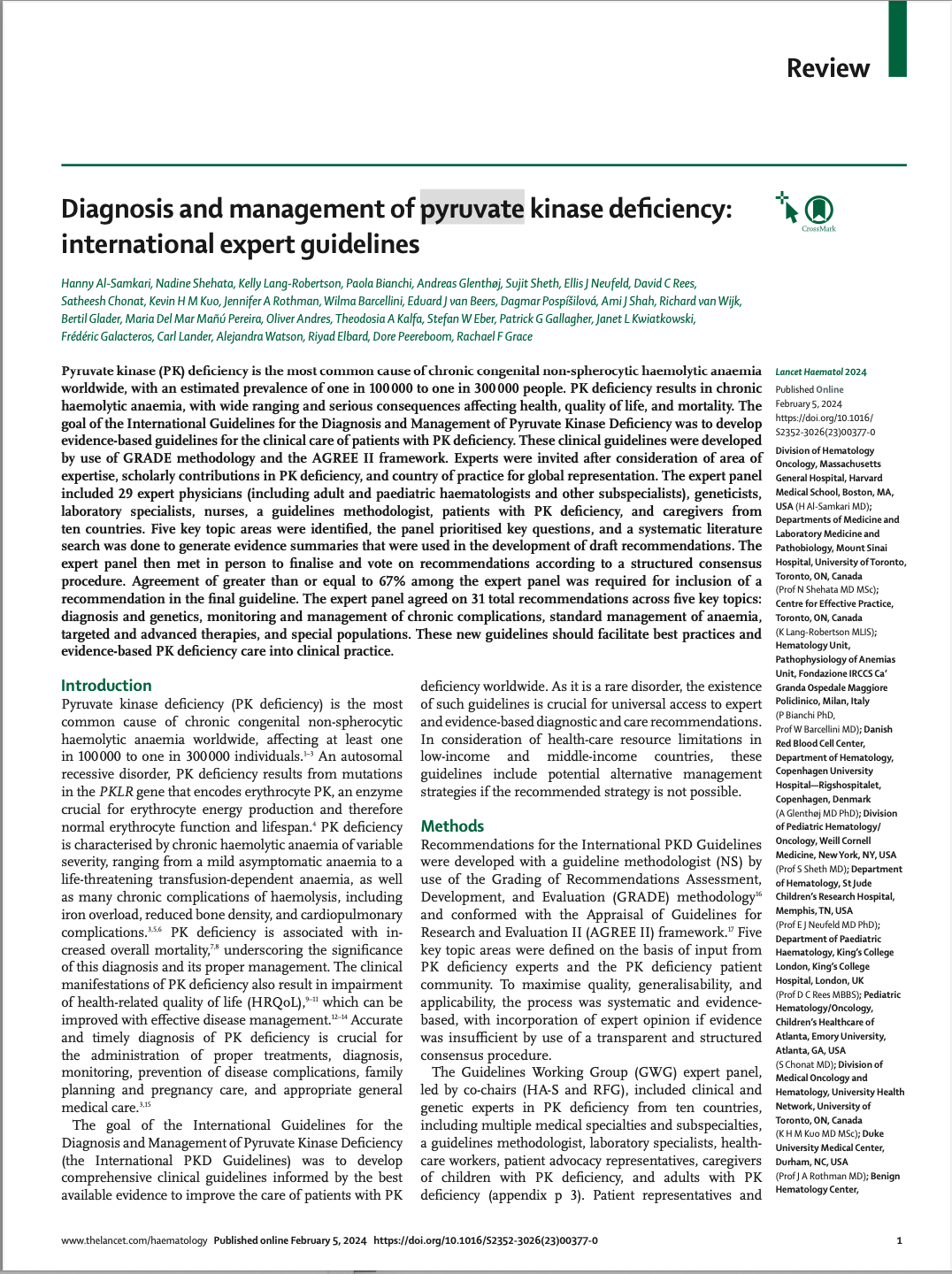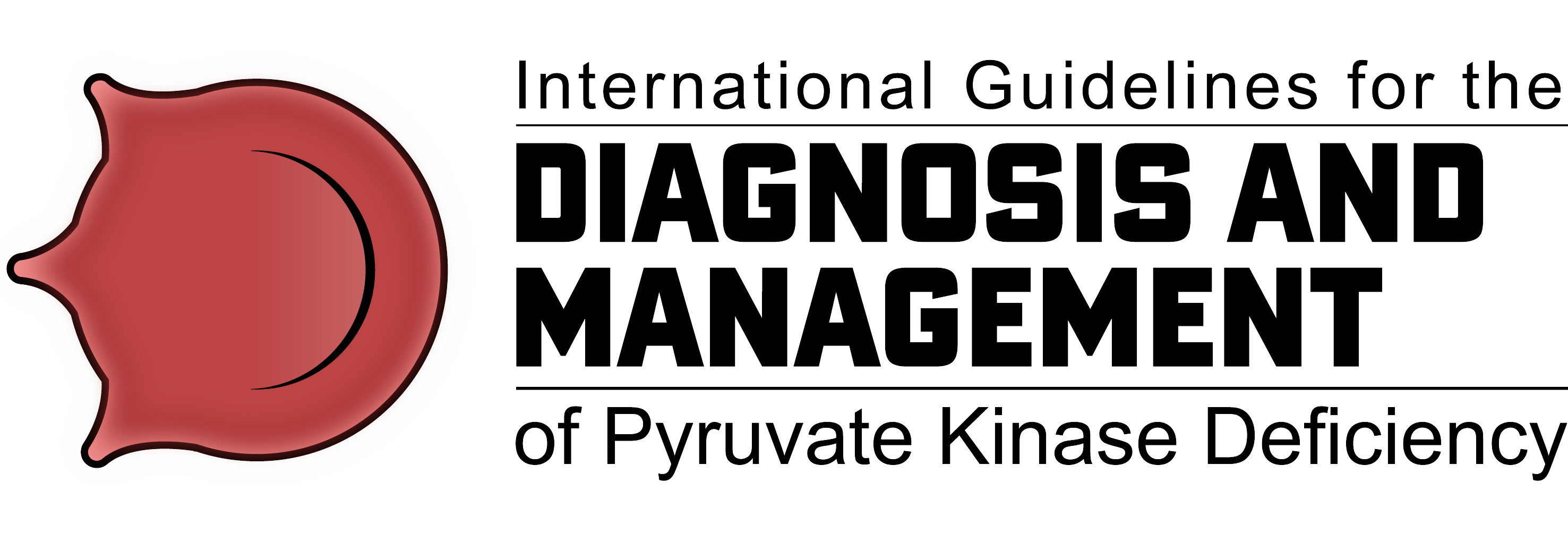Pyruvate kinase (PK) deficiency is the most common cause of chronic congenital non-spherocytic haemolytic anaemia worldwide, with an estimated prevalence of one in 100 000 to one in 300 000 people. PK deficiency results in chronic haemolytic anaemia, with wide ranging and serious consequences affecting health, quality of life, and mortality. The goal of the International Guidelines for the Diagnosis and Management of Pyruvate Kinase Deficiency was to develop evidence-based guidelines for the clinical care of patients with PK deficiency. These clinical guidelines were developed by use of GRADE methodology and the AGREE II framework. Experts were invited after consideration of area of expertise, scholarly contributions in PK deficiency, and country of practice for global representation. The expert panel included 29 expert physicians (including adult and paediatric haematologists and other subspecialists), geneticists, laboratory specialists, nurses, a guidelines methodologist, patients with PK deficiency, and caregivers from ten countries. Five key topic areas were identified, the panel prioritised key questions, and a systematic literature search was done to generate evidence summaries that were used in the development of draft recommendations. The expert panel then met in person to finalise and vote on recommendations according to a structured consensus procedure. Agreement of greater than or equal to 67% among the expert panel was required for inclusion of a recommendation in the final guideline. The expert panel agreed on 31 total recommendations across five key topics: diagnosis and genetics, monitoring and management of chronic complications, standard management of anaemia, targeted and advanced therapies, and special populations. These new guidelines should facilitate best practices and evidence-based PK deficiency care into clinical practice.

Available at: https://doi.org/10.1016/S2352-3026(23)00377-0.
Download the Full Guidelines
The journal-formatted PDF of the full Guidelines Manuscript (as shown in the image to the right) is published at The Lancet Haematology and requires journal access to download (as is granted by most educational institutions and hospitals). Due to journal policies, we are not permitted to post the journal-formatted PDF on this website. However, we are permitted to host a final word document version of the article for download. Below, you will find a word document version of the Guidelines Manuscript as well as the Supplementary Appendix. The Guidelines Manuscript contains all of the guideline recommendations, with brief clinical considerations and descriptions of the evidence used by the guidelines working group to develop the recomendation. The Supplementary Appendix contains all of the guideline recommendations, with full-length, comprehensive descriptions of the clinical considerations and evidence for each recommendation, as well as additional information pertaining to the guidelines methodology, external review, working group members, and future directions for guideline development.
Clinical Recommendations from the International
PK Deficiency Guidelines Table
Recommendation
Certainty of Evidence
Strength of Recommendation
Agreement
Diagnosis and Genetics of Pyruvate Kinase Deficiency
A1. The expert panel recommends testing for pyruvate kinase deficiency in all patients with non-immune hemolytic anemia after exclusion of hemoglobin disorders and erythrocyte membrane disorders.
Moderate
Strong
91%
A2. The expert panel recommends initial testing for pyruvate kinase deficiency using either PKLR gene molecular analysis or pyruvate kinase enzyme activity (when performed following established testing guidance) as both methods currently have similar performance in the diagnosis of pyruvate kinase deficiency.
Moderate
Strong
95%
A3. The expert panel recommends confirmation of a diagnosis of pyruvate kinase deficiency initially made with pyruvate kinase enzyme activity measurements with PKLR gene molecular analysis.
Moderate
Strong
91%
A4. The expert panel recommends confirmation of a diagnosis of pyruvate kinase deficiency initially made with PKLR gene molecular analysis with pyruvate kinase enzyme activity measurement in patients without two known pathogenic mutations in PKLR.
Moderate
Strong
100%
A5. The expert panel recommends against the use of pyruvate kinase enzyme activity predicting disease severity or disease course.
Moderate
Strong
100%
Monitoring and Management of Chronic Complications of Pyruvate Kinase Deficiency
B1. The expert panel recommends screening for iron overload with serum ferritin in children and adults with pyruvate kinase deficiency to detect and avoid complications of iron overload, irrespective of transfusion status, beginning at 3 years of age or after 12 transfusion episodes, whichever occurs first.
Low
Strong
100%
B2. The expert panel recommends measurement of liver iron concentration using magnetic resonance imaging in children and adults with pyruvate kinase deficiency with consistent serum ferritin measurements >500 ng/mL to detect and avoid complications of hepatic iron overload, irrespective of transfusion status.
Low
Strong
100%
B3. The expert panel recommends cardiac iron measurement using magnetic resonance imaging in all patients with pyruvate kinase deficiency with liver iron concentration greater than 7 mg/g dry weight to detect and avoid complications of cardiac iron overload, irrespective of transfusion status.
Low
Strong
92%
B4. The expert panel recommends iron chelation therapy in patients with pyruvate kinase deficiency aged 2 years or older who have a liver iron concentration exceeding 5 mg/g dry weight, irrespective of transfusion status, to reduce the risk of complications from iron overload.
Low
Strong
100%
B5. The expert panel recommends iron chelation therapy in patients with pyruvate kinase deficiency aged 2 years or older who have received >12 transfusions, or serum ferritin >1000 ng/ml, to reduce the risk of complications from iron overload.
Low
Strong
100%
B6. The expert panel suggests echocardiography in all patients with pyruvate kinase deficiency 18 years of age or older to screen for pulmonary hypertension.
Very low
Conditional
100%
B7. The expert panel recommends annual 25-hydroxy vitamin D measurement beginning at one year of age in all patients with pyruvate kinase deficiency not on regular supplementation to detect and treat vitamin D deficiency and reduce the risk of bone density loss.
Low
Strong
100%
B7. The expert panel recommends annual 25-hydroxy vitamin D measurement beginning at one year of age in all patients with pyruvate kinase deficiency not on regular supplementation to detect and treat vitamin D deficiency and reduce the risk of bone density loss.
Low
Strong
100%
B8. The expert panel recommends screening for reduced bone mineral density using dual-energy x-ray absorptiometry (DEXA) scanning in all patients with pyruvate kinase deficiency beginning at 18 years of age to diagnose and manage low bone mineral density, osteopenia, and osteoporosis.
Low
Strong
92%
B9. The expert panel recommends age-appropriate laboratory endocrine monitoring in patients with pyruvate kinase deficiency receiving regular transfusions, and non-transfused patients who have iron overload, defined as serum ferritin >1000 ng/mL or liver iron concentration >5 mg/g dry weight, to identify and treat endocrinologic complications of iron overload.
Low
Strong
100%
B10. The expert panel suggests monitoring of renal function in children and adults with pyruvate kinase deficiency, irrespective of transfusion status for early detection of renal dysfunction.
Low
Strong
68%
Standard Management of Anemia in Pyruvate Kinase Deficiency
C1. The expert panel recommends discussion of the individualized risks and benefits of splenectomy to treat anemia in children greater than 5 years old and adults who require regular or frequent red cell transfusions or who have symptomatic anemia, to reduce transfusion burden and alleviate symptoms.
Moderate
Strong
96%
C3. The expert panel recommends treatment with regular red cell transfusions in children 5 years of age and older and adults with pyruvate kinase deficiency who have symptomatic anemia despite splenectomy or are unsuitable for or unwilling to undergo splenectomy to improve symptoms of anemia.
Low
Strong
92%
C4. The expert panel recommends red cell transfusions be administered to children and adults with pyruvate kinase deficiency based on anemia symptoms and complications rather than a universal hemoglobin transfusion threshold.
Low
Strong
87%
C5. The expert panel suggests that if a splenectomy is planned in a patient with pyruvate kinase deficiency, cholecystectomy is also considered and discussed with the patient, family, and/or caregiver.
Low
Conditional
96%
C6. The expert panel recommends that appropriate psychological support be offered to children and adults with pyruvate kinase deficiency and their families and/or caregivers.
Low
Strong
100%
Targeted & Advanced Therapies in Pyruvate Kinase Deficiency
D1. The expert panel recommends initiation of mitapivat therapy in adult patients High with pyruvate kinase deficiency who are anemic, who are not regularly transfused, and who do not have two non-missense mutations, irrespective of splenectomy status, to improve hemoglobin and health-related quality of life.
High
Strong
100%
D2. The expert panel recommends that “failure to respond” to mitapivat in patients with pyruvate kinase deficiency who are not regularly transfused should be declared only after at least 3 months of treatment with mitapivat at an optimal or maximum dose.
High
Strong
100%
D3. The expert panel recommends initiation of mitapivat therapy in adult patients with pyruvate kinase deficiency who are regularly transfused and who do not have two non-missense mutations, irrespective of splenectomy status, to reduce transfusion burden.
Moderate
Strong
92%
D4. The expert panel recommends discontinuation of mitapivat therapy, and return to best supportive care, in patients with pyruvate kinase deficiency who are non-responders to mitapivat, irrespective of transfusion status.
Moderate
Strong
92%
D5. The expert panel recommends consideration of alternative approaches, including clinical trials, in patients with pyruvate kinase deficiency who are non- responders to mitapivat, irrespective of transfusion status.
Very low
Strong
100%
D6. The expert panel recommends discontinuation of mitapivat therapy in patients with pyruvate kinase deficiency receiving regular transfusions who do not achieve at least a 33% reduction in transfusion requirement, with the exception of patients who achieve marked improvement in iron status, patient- reported health outcomes, jaundice, or other key disease parameters.
Low
Strong
88%
D7. The expert panel recommends that adults with pyruvate kinase deficiency who are regularly transfused and who have not undergone splenectomy receive a trial of mitapivat therapy prior to consideration of splenectomy.
Low
Strong
100%
D8. The expert panel suggests that pyruvate kinase deficiency-specific measures of health-related quality of life (patient-reported outcomes) can be a determining factor of success in an individual trial of mitapivat in cases where the reduction in transfusion burden or increase in hemoglobin falls short of an arbitrary numerical cutoff.
Moderate
Conditional
82%
Special Populations in Pyruvate Kinase Deficiency
E1. The expert panel recommends regular monitoring of children and adults with pyruvate kinase deficiency by a hematologist, irrespective of transfusion status.
Good practice statement
96%
E2. The expert panel recommends that women with pyruvate kinase deficiency irrespective of transfusion status who are pregnant or are planning pregnancy be referred to a multidisciplinary feto-maternal team (including a hematologist, obstetrician, neonatologist, and other specialists as appropriate) to reduce maternal and fetal complications.
Good practice statement
100%
Certainty of Evidence:
Strength of Recommendation:
The strength of a recommendation indicates the extent to which one can be confident that adherence to the recommendations will do more good than harm.
Agreement:
The Expert Panel consisted of 31 members. Agreement of >67% was required for a recommendation to be included in the final guidelines.
